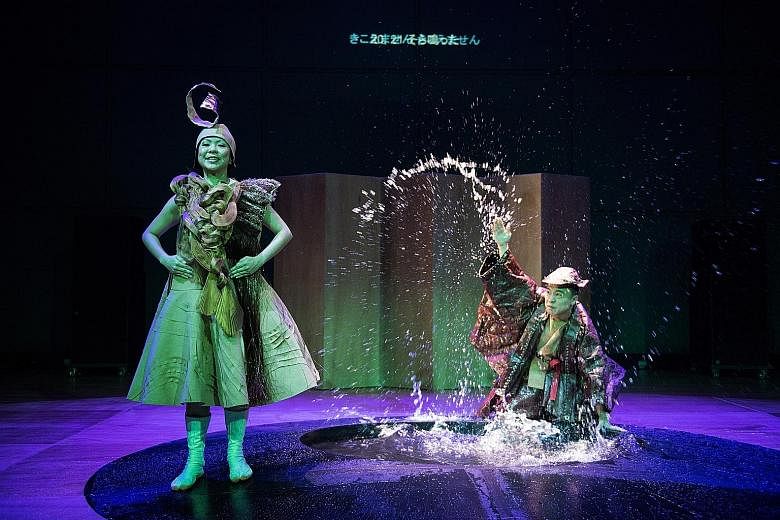REVIEW / THEATRE
DRUMS
Shigeki Nakano And Chong Tze Chien/Esplanade Presents: Super Japan - Japanese Festival Of Arts
Esplanade Recital Studio Last Saturday
The new Japanese Festival of Arts presented by the Esplanade is off to a weird, wonderful, wacky start with two reinterpretations of a modern classic of Noh drama.
Drums is a double bill, with Singapore director Chong Tze Chien and Japan's Shigeki Nakano presenting back-to-back hour-long plays inspired by Yukio Mishima's The Damask Drum.
Mishima's tale centres on an old gardener's hopeless passion for a well-born beauty. She mocks his infatuation by promising to be his if he can coax sound from a voiceless drum.
Chong's version is staged first and echoes the Noh tradition of deliberate gestures and elaborate costumes (MAX.TAN, melding space-age sensibilities and traditional silhouettes). The language is poetic and the dialogue quotes evolutionary biologist Richard Dawkins.
On one level, this is a story about a man in charge of a small park, who falls hopelessly in love with the beautiful owner of the penthouse across the street. On another, this is the despairing cry of nature swallowed by the relentless encroachment of concrete and steel on green spaces.
Versatile actors Oliver Chong and Jean Ng play five human characters and several animal ones, aided by costumes, exaggerated motions and voiceovers by Remesh Panicker.
Stage design by directors Chong and Nakano and the actor Chong is minimalist. A wooden changing screen acts as the wings of the stage or a wall while a pool of water in the centre serves variously as a pond or the drum or the line between physical and metaphysical worlds. Sound by Darren Ng and lighting by Lim Woan Wen allow the audience to fill in the details.
Nakano's staging adds a potted plant and some white bricks, neatly used to create a model of the Marina Bay Sands hotel, currently Singapore's best-known landmark. This is one of the ways in which Nakano circles the theme of modernisation and urbanisation versus natural tranquillity and his play is a fun homage to pop culture.
Played out on stage are cliches of Japanese high-school dramas - crushes, sexual awakening, bullying, suicide - and the American slasher film movies of the Friday The 13th series. (Unfortunately, the play premiered on Saturday the 14th.)
In the American films, a hockey- masked killer attacks teens camping near a lake. The identity of the killer changes from movie to movie, ranging from the mother of a teen who drowned in the lake at an earlier camp to the supposedly drowned boy.
Nakano's play similarly circles around the identity of the victim and the killer, weaving in the story of a high-school student (Takeshi Fukuda), whose crush on a schoolmate (Maki Koizumi) was nipped in the bud by two pranksters at the same school (Singapore's Ellison Tan and Japan's Yuya Tanaka, pitch-perfect as bullies in over their heads).
Fukuda's lovelorn character is out for revenge on the two who turned his romance into a tragedy, but the play raises a lovely question about the futility of revenge versus rising above catastrophe.
This spiritual note was similarly embodied in Chong's version and the resonance rings out with such delightful confidence that the double bill can only end with the drum of applause.


